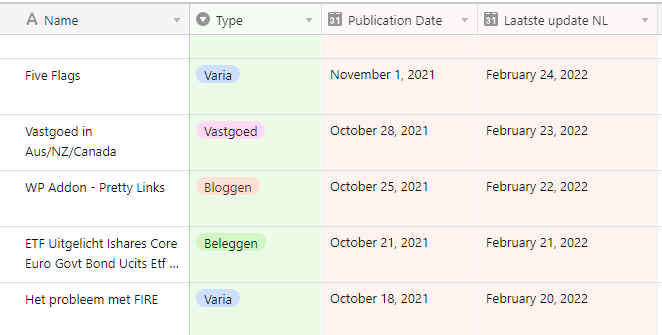Snelle Tip #5: Update je artikels
Vandaag geef ik jullie een vijfde tip voor een succesvolle blog te maken: update je artikels regelmatig.
Eerder al heb deze tips gegeven, dus je kan die altijd eens nalezen als je wil:
Update je artikels
Om goed gevonden te worden via zoekmachines zoals Google, zijn er tal van factoren belangrijk.
Je moet eerst en vooral degelijke artikels schrijven.
Het is bijna niet meer mogelijk om onzin te produceren met duizendmaal je gewenste keyword en nog in de top 10 ervoor te komen.
De algoritmes van zoekmachines zijn zeer geavanceerd geworden, en proberen hun gebruikers de best mogelijke bronnen voor hun zoekopdrachten te geven.
Als je een goed artikel schrijft, waarbij je ook rekening houdt met SEO (Search Engine Optimization), heb je veel kans dat je zal verschijnen in de eerste pagina’s voor een bepaalde zoekopdracht.
Het is tevens belangrijk om een betrouwbare, gevestigde en actieve site te hebben.
Die eerste twee factoren slaan op de veiligheid van je site en de ouderdom ervan.
Als je al jaren bezig bent en een goede reputatie hebt bij de algoritmes, zal een nieuw artikel veel meer kans hebben om verkozen te worden boven een artikel van een concurrerende site die nog niet zo lang bezig is.
De derde factor is degene die belangrijk is voor de tip van vandaag: je site moet “actief” zijn.
Dat komt 90% neer op actief nieuwe zaken publiceren. Als je slechts eens in de zes maanden een nieuw artikel op je site zet, is de kans zeer groot dat je langzaam maar zeker uit de zoekopdrachten zal worden gewijderd.
Het lijkt immers niet meer dat jij “up to date” bent, dat je verouderde informatie aanlevert.
Regelmatig artikels schrijven en die via een schema publiceren is dus uitermate belangrijk.
In de vorige tip heb ik uitgelegd hoe ik persoonlijk mijn artikels plan.
De overige 10% van een actieve site is je oude artikels updaten.
Wat bedoel je precies met updaten?
Updaten komt neer op een artikel wat couranter maken, er wat nieuwe tekst bij publiceren, cijfers aanpassen, of er een “Laatste update: DATUM” bij plakken, zoals je kunt zien bij veel van mijn artikels.
Dit is niet alleen handig voor bezoekers (die kunnen dus zien dat de informatie op jouw artikel nog relevant is, en werd aangepast aan nieuwe ontwikkelingen), maar ook voor de zoekmachines wiens “bots” merken dat er activiteit was op dat artikel, en dat het dus nog steeds actief, courante en de moeite om te laten verschijnen in de zoekresultaten is.
Wanneer moet je je artikels updaten?
Je artikels updaten kan je op meerdere manieren aanpakken.
Als je er nog niet heel veel hebt geschreven, kan je dit een beetje improviseren en vanaf je wat nieuwe informatie leert over een bepaald onderwerp, teruggaan naar artikels die dit onderwerp aanhalen, en ze updaten.
Maar eens je honderden artikels hebt geschreven, begint dit niet echt haalbaar te worden. Dat is geen efficiënt gebruik van je tijd.
Een betere optie is dus, zoals bij zoveel dingen in het leven, om dit op voorhand gewoon te plannen.
Leg vast wanneer je welk artikel gaat updaten, en leg dit vast in je doelen voor de maand/week/dag.
Persoonlijk ben ik al een tijdje bezig met elke dag een van mijn artikels te updaten, omdat ik dit eerlijk gezegd te lang had uitgesteld.
Momenteel zit ik ongeveer 4 maanden achter op mijn huidige publicatieschema, wat betekent dat ik elke dag een artikel update dat ik 4 maandne geleden heb geschreven.
Zoals gewoonlijk gebruik ik om dit bij te houden de eenvoudige en gratis software Airtable:

Ik publiceer 2 artikels en update er 7 per week, dus zoals je wel kan zien zullen deze 2 schema’s binnenkort dicht bij elke in de buurt komen.
Mijn plan is om te stoppen met dagelijks een update te publiceren zodra er 1 maand tussen het publiceren en het updaten zit.
Vanaf dat punt ga ik gewoon 3 maal per week een update doorvoeren. 2x voor de oudste artikels, en eenmaal voor het meest recente.
Dat zal ervoor zorgen dat mijn hele site redelijk up to date blijft, wat tot hogere ranking bij zoekmachines zal leiden.



